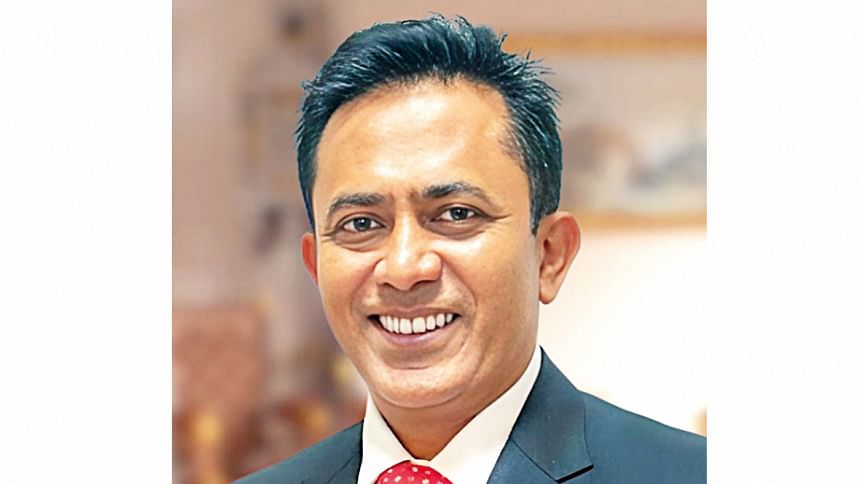Expand refinancing programmes

The Daily Star (TDS): United Finance has been recognised as a top performer in the 'Sustainability Rating 2023' by Bangladesh Bank. What are the most innovative and impactful sustainable financing products or strategies that contributed to this achievement?
Mohammad Rafiqul Islam (MRI): United Finance Limited is honoured to be recognised as one of the top institutions in the 'Sustainability Rating 2023' by Bangladesh Bank. This accolade underscores our commitment to fostering economic development while prioritising environmental and social sustainability, alongside maintaining robust core banking performance.

A key pillar of our success is our focus on green and sustainable financing, supporting projects in renewable energy, energy-efficient technologies, and sustainable infrastructure. These initiatives are strategically designed to drive systemic change towards a sustainable future while ensuring financial stability.
Our innovative approach is supported by a strong impact assessment framework, which allows us to evaluate the environmental and social effects of our lending practices. This ensures that our financial products deliver positive outcomes while aligning with broader sustainability goals, reinforcing our commitment to transparency.
Equally, we prioritise robust core performance ratios, including profitability, liquidity, capital adequacy, and a healthy Non-Performing Loan (NPL) ratio. By aligning green financing with these metrics, we ensure that our sustainability efforts enhance financial stability through long-term value creation and risk mitigation.
We have also cultivated partnerships with development agencies and financial institutions, broadening the impact of our sustainable finance initiatives. These collaborations enable us to drive innovation, amplify our efforts, and strengthen our financial performance.
By balancing sustainability with strong core banking metrics, United Finance advances sustainability within the financial sector while ensuring financial health. This dual focus allows us to address urgent societal and environmental challenges, working towards a sustainable and financially sound future for Bangladesh.
TDS: What future plans does United Finance have to further enhance sustainability within the financial sector?
MRI: Looking ahead, United Finance is steadfast in its commitment to advancing sustainability within the financial sector through strategic and innovative actions. We recognise that the journey towards sustainability is ongoing, and as such, we have outlined several key initiatives to further enhance our contributions in this area.
A primary focus of our future plans is the expansion of our sustainable financing portfolio, with particular emphasis on supporting renewable energy projects and other environmentally responsible initiatives. By increasing our investment in these areas, we aim to play a pivotal role in driving the transition to a low-carbon economy.
In addition to expanding our product offerings, we are also committed to integrating digital innovations into our sustainability efforts. We believe that digital technologies hold immense potential to revolutionise green financing by making it more accessible, efficient, and impactful. By adopting and implementing these technologies, we can streamline our operations, reduce our carbon footprint, and enhance the overall effectiveness of our sustainable finance initiatives.
Strengthening our partnerships with key stakeholders will continue to be a central pillar of our strategy. We recognise that sustainability is a collective effort, and by fostering a collaborative approach, we can drive greater innovation and achieve more substantial results. By promoting environmental consciousness and integrating sustainable practices across all levels of our organisation, United Finance aims to be a catalyst for sustainable growth and development in the financial industry.
TDS: What forms of government support would be most effective in advancing the efforts in sustainable finance?
MRI: To effectively advance sustainable finance, we believe that targeted government support is crucial. Several key areas where government intervention could significantly enhance our efforts and those of the broader financial sector in driving sustainability include:
One of the most impactful forms of support would be the expansion of refinancing programmes specifically designed for green and sustainable projects. By providing access to lower-cost capital, these programmes would enable financial institutions like United Finance to offer more competitive rates on sustainable financing products, thereby encouraging greater uptake among businesses and consumers.
In addition to refinancing programmes, targeted incentives and subsidies for green projects would serve as a powerful catalyst for sustainability. Such incentives could help offset the higher upfront costs associated with sustainable technologies and infrastructure, making them more accessible and attractive to a wider range of stakeholders. Furthermore, implementing a lower general provision requirement for green financing could significantly enhance its appeal.
A lower provision requirement would encourage banks and financial institutions to allocate more resources to green projects. This combination of incentives, subsidies, and favourable regulatory provisions would drive greater investment in sustainable initiatives and accelerate the transition to a more sustainable economy.
Increasing public awareness of eco-friendly financial products is another key area where government support can make a significant impact. Government investment in education and awareness campaigns can shift consumer behaviour towards more sustainable choices, thereby boosting demand for green financial products and services. Moreover, fostering collaboration between the public and private sectors is essential for spurring innovation in sustainable technologies and practices.
Finally, offering specialised training for the financial sector on green finance and sustainable practices is essential for ensuring that the sector is equipped to manage the green transition. Promoting adherence to green banking principles across the sector, improving access to financial services for underserved communities, and partnering with international organisations will also be crucial in advancing the overarching goal of a sustainable and equitable financial system.

 For all latest news, follow The Daily Star's Google News channel.
For all latest news, follow The Daily Star's Google News channel. 



Comments